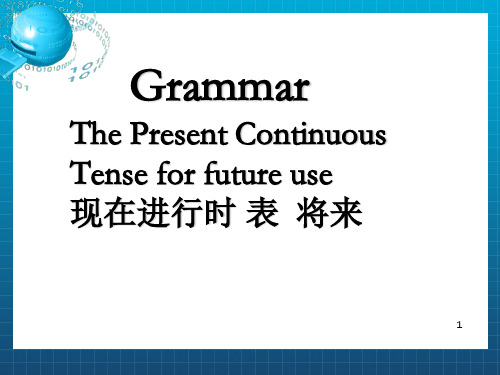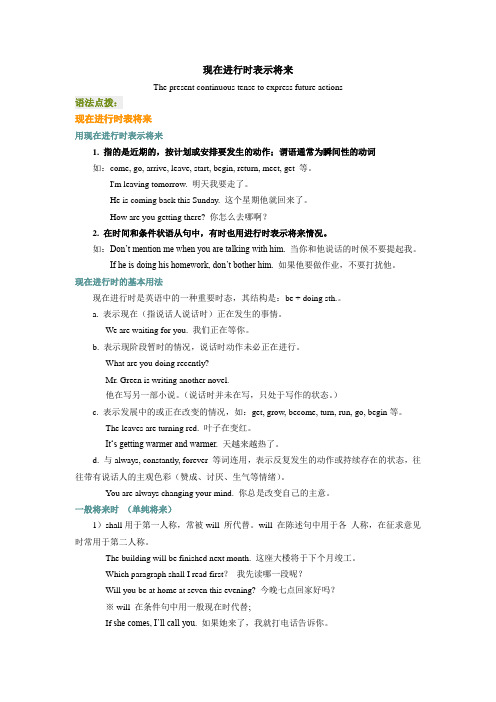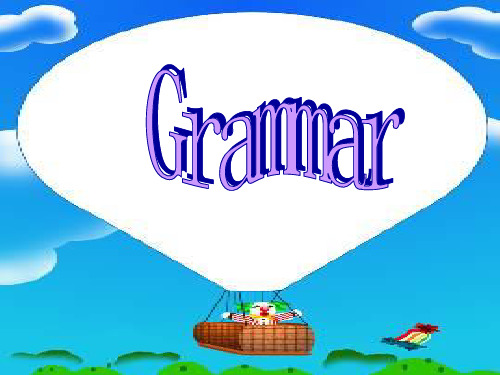grammar_现在进行时表将来111111
grammar_现在进行时表将来

I was about to go swimming when my guide shouted at
me and told me not to do so.
我正要去游泳, 这时向导大声叫我不要去。
⑤一般现在时ave, move, start, return, arrive, begin,
_____a_r_e_s_t_ay(isntgay) in Beijing for a
week. They ______a_re_ g(gooin)gto Xi’an.
They _______a_re__ge(tgtient)gthere by air.
14
表将来的时态其他方法:
• He will write you a letter next week. • We’re not going to have any classes n
We are going to have a meeting today.
③ be to+动词原形:表示按计划要发生的事或征求 对方意见,事先安排好的。
16
Are we to go on with this work?
④ be about to+动词原形,表示即将发生的动作,不 与表示将来的时间状语连用。
(comies)ctomminygoffice after work. I
(drive) hoamednroivwin.g
19
请用5句话表达下面所有的信息。
期中考快到了,全班同学都正在忙 着复习。Lucy,你的老朋友, 在考试前 夕总会生病。这个周末,你和Minnie 打
算去探望她,并且给她带束花。然后, 你们还会到电影院看场电影轻松一下。
23
•内容(全部信息):5分 5 sentences
Unit 3 Grammer 现在进行时表示将来

现在进行时表示将来The present continuous tense to express future actions语法点拨:现在进行时表将来用现在进行时表示将来1. 指的是近期的,按计划或安排要发生的动作;谓语通常为瞬间性的动词如:come, go, arrive, leave, start, begin, return, meet, get 等。
I'm leaving tomorrow. 明天我要走了。
He is coming back this Sunday. 这个星期他就回来了。
How are you getting there? 你怎么去哪啊?2. 在时间和条件状语从句中,有时也用进行时表示将来情况。
如:Don‟t mention me when you are talking with him. 当你和他说话的时候不要提起我。
If he is doing his homework, don‟t bother him. 如果他要做作业,不要打扰他。
现在进行时的基本用法现在进行时是英语中的一种重要时态,其结构是:be + doing sth.。
a. 表示现在(指说话人说话时)正在发生的事情。
We are waiting for you. 我们正在等你。
b. 表示现阶段暂时的情况,说话时动作未必正在进行。
What are you doing recently?Mr. Green is writing another novel.他在写另一部小说。
(说话时并未在写,只处于写作的状态。
)c. 表示发展中的或正在改变的情况,如:get, grow, become, turn, run, go, begin等。
The leaves are turning red. 叶子在变红。
It…s getting warmer and warmer. 天越来越热了。
d. 与always, constantly, forever 等词连用,表示反复发生的动作或持续存在的状态,往往带有说话人的主观色彩(赞成、讨厌、生气等情绪)。
高中英语必修一unit3Grammar-现在进行表将来

3) Bob is coming to visit his grandfather.
小结: 此三句是现在进行时态表示将来 的动作,表示按计划或安排将要进 行的动作.
这类动词通常是瞬间动作,只限 于少数动词,常见的有:
C. is closing down D. had had closed down (close down关闭,歇业)
2. I’ve won a holiday for two weeks to Florida. I___A___ my mum.
A.am taking B. have taken
C. take
(3)表示反复性或习惯性的动作 (常与always, continually[频繁地]连用,表示 赞扬,厌恶,不满,遗憾等感情色彩)
例句: He is always helping others. 赞扬
二.现在进行时表将来
Find the rules by yourself.
1) Betty is leaving for Guangzhou by plane tomorrow.
例句:You are to grow up one day. 总有一天你会长大。
Байду номын сангаас
附:高考题 1.Because the shop_____C______, all the T-
shirts are sold at half price
A. has closed down B. closed down
一.现在进行时
1.结构:be(am/is/are)+doing 2.用法: (1)表示说话时正在进行的动作(常与 时间状语now, at the moment连用)
现在进行时表将来的用法归纳

现在进行时表将来的用法归纳在英语语法中,现在进行时通常用来描述正在进行的动作,但它也有一个比较特殊且重要的用法,那就是表示将来。
这种用法可能会让一些学习者感到困惑,不过只要我们理解其规律和特点,就能轻松掌握。
首先,我们要明确现在进行时表将来的基本概念。
当现在进行时用于表示将来时,它所表达的不是正在发生的动作,而是计划、安排好将要发生的动作。
这些动作通常是已经确定了时间或者已经做好了准备,即将发生。
那么,在什么情况下会使用现在进行时来表将来呢?常见的有以下几种情况:一是表示位移的动词,比如 come、go、leave、arrive、start 等。
例如,“I'm leaving tomorrow”(我明天离开。
)这里用“am leaving”表示已经决定好并且即将在明天发生的离开这个动作。
再比如,“He is coming this evening”(他今晚要来。
)“coming”表明他来的这个动作已经安排好在今晚。
二是某些非位移动词,如 do、have、meet、play 等,当它们用于表示已经计划或安排好的将来动作时,也可以用现在进行时。
比如,“We are having a party next week”(我们下周要举办一个派对。
)“having”在这里表示已经计划好的下周的派对。
三是一些表示交通方式的动词短语,如 take off(起飞)、land(着陆)等。
比如,“The plane is taking off in an hour”(飞机一小时后起飞。
)在使用现在进行时表将来时,我们需要注意一些要点。
其一,这种用法通常与表示将来的时间状语连用,像 tomorrow、next week、soon、in a few days 等。
这能让听话者更加明确动作发生的时间。
其二,现在进行时表将来强调的是动作的计划性和确定性。
如果只是一种可能性或者不太确定的将来动作,就不太适合用现在进行时。
grammar将来时的6种表达法

3. 我将派约翰去帮助你。 _I_’m__g_o_i_n_g__to__s_en__d_J_o_h_n__t_o_h_e_l_p_y_o_u_.
4. 约翰和玛丽买了一些家具, 他们打算 下个月结婚。
_J_o_h_n_a_n_d__M__a_r_y_b_o_u__g_h_t _s_o_m_e__fu_r_n_i_t_u_r_e, _th_e_y__a_r_e_g_o_i_n_g_t_o_m__a_r_r_y_n_e_x_t_m__o_n_t_h_.__
e.g. We are to discuss the report next Saturday.
六. be about to + 动词原形 be about to do sth, 表示即将发生的动作。
e.g. He is about to leave for Beijing.
注意: be about to不能与tomorrow, next week等表示明确将来时间的状语连用
---I’m sure your parents __a_re__p_ro_u_d__o_f __you, and I believe you’re going to have an exciting year….
Match the types of sentences with a, b, or c.
a 2.So I’m getting up at about 6 go get everything ready.
Present Continuous
c
3.I’m going to work as a volunteer teacher in a small country town in Inner Mongolia.
语法全解:现在进行时表示将来

语法全解:现在进行时表示将来一、现在进行时表示将来时注:现在进行时表示将来时,其计划性较强,往往暗示该动作是可以改变的1.现在进行时除表示现在正在进行的动作之外,还可以表示较近的将来,常有“意图”, “安排”或“打算”的含义.这种用法比较生动,给人一种期待感,此时所使用的动词多是转移动词,如:come, go, start, leave, stay, go, travel, take off, fly, see, arrive, return等.例如: I am leaving tomorrow. 我明天要离开.Are you staying here till next week? 你要在这儿呆到下周吗?I am going.我要走了.We’re leaving for Nanjing tomorrow.我们明天就去南京.When are you leaving? 你们什么时候动身?They’re coming here this afternoon. 他们今天下午来这儿.2.表示将来的现在进行时除用于转移动词外,也可用于某些非转移动词.如do, buy, meet, have, play, publish等,此时句中一般要要表示将来的时间状语.例如: What are you doing next Sunday? 下星期天你打算干什么?My mother is buying me a bike soon. 我妈妈不久将给我买一辆自行车.I’m meeting you after class. 课后我要找你.3.现在进行时偶尔也表示较远的将来.例如: When I grow up, I’m joining the army. 我长大了要参军.4.表示将来的现在进行时有时含有“决心”的意思,多用于否定结构中.例如: I’m not going there. 我不去那儿了.I’m not waiting for him any longer. 我不再等他了.二.一般现在时表将来时注:一般现在时表示将来时,客观性较强,多指按时刻或规定要发生的动作或事件,适用于这种用法的动词往往表示“出发”, “到达”等,如arrive, leave, start, go等.例如: The plane arrives at 2:30 this afternoon. 飞机将于今天下午2:30抵达.1/ 1。
现在进行时表将来的用法归纳
现在进行时表将来的用法归纳在英语语法中,现在进行时通常用于描述正在发生的动作,但有时候它也可以用来表示将来的计划或安排。
这种用法可能会让学习者感到困惑,但其在实际交流中却非常常见且实用。
接下来,让我们详细归纳一下现在进行时表将来的用法。
首先,我们要明确现在进行时表将来的基本概念。
当现在进行时用于表示将来时,它强调的是计划、安排已经确定,并且即将发生的动作。
这种用法常常与表示将来时间的状语连用,比如“tomorrow(明天)”“next week(下周)”“soon(不久)”等。
比如,“I'm leaving tomorrow”(我明天离开。
)在这个句子中,“am leaving”就是现在进行时,但它表达的是一个将来的动作,即明天的离开已经计划好并且确定了。
再看,“She is coming here next week”(她下周来这儿。
)“is coming”是现在进行时,结合“next week”这个时间状语,清晰地表达了她下周要来这里的计划。
那么,现在进行时表将来常用于哪些动词呢?常见的有“go”“come”“leave”“arrive”“start”“begin”“return”等表示移动或开始结束的动词。
例如,“The train is arriving soon”(火车很快就到。
)“arriving”体现了火车即将到达的这个未来动作。
又如,“He is starting work next month”(他下个月开始工作。
)“is starting”表明了下个月开始工作这一将来的安排。
除了单个动词,一些动词短语在这种情况下也会使用现在进行时来表示将来。
比如“be going to”结构,虽然它本身就有表示将来的意思,但当它用于进行时态时,更加强调计划的确定性和紧迫性。
比如,“I'm not going to watch TV tonight I have too much homework to do”(我今晚不打算看电视。
现在进行时表将来的用法归纳
现在进行时表将来的用法归纳现在进行时是英语中常用的时态之一,用来表达当前正在进行的动作或状态。
然而,除了表示当前的动作或状态外,现在进行时还可以用来表示将来即将发生或安排好的动作。
本文将对现在进行时表达将来的用法进行归纳,以帮助读者更好地理解和运用该语法。
一、表达将来发生的计划或安排现在进行时可以用来表示已经计划或安排好的将来动作。
这种用法通常与时间状语词或上下文中的其他信息相结合,明确表示将来的时间。
例句:1. I am having dinner with Jane tomorrow evening.(我明天晚上和简共进晚餐。
)2. They are going to the concert next week.(他们下周去听音乐会。
)3. We are leaving for vacation on Friday.(我们周五出发去度假。
)二、表达按计划即将发生的动作现在进行时还可以用于表示按计划即将发生的动作。
这种用法是在现在进行时的基础上加上适当的时间状语词或修饰词,以明确表示将来即将发生的时间。
例句:1. She is coming to visit us next month.(她下个月来看我们。
)2. The train is arriving in ten minutes.(火车将在十分钟后到达。
)3. He is giving a presentation at the conference tomorrow.(他明天在会议上做演讲。
)三、表达预测的未来发展现在进行时还可以用来表达对未来发展的预测或预期。
这种用法常常与副词或表预测的动词相结合,以表示某个事态或动作在将来可能继续发展或进行。
例句:1. The population is increasing rapidly.(人口在迅速增长。
)2. Technology is advancing at an unprecedented pace.(科技正在以前所未有的速度发展。
新课标UNIT 3GRAMMAR用现在进行时表示将来
当句子涉及确切的计划、明确的意图和为将来安排好的活动时,现在进行时可用于表示将来。
现在进行时经常用于表示将来确切的计划。
练一练!
注意!
另外,表示将来的动作或状态,还可用以下几种形式:
i shall be seventeen years old next month.
② be going to+动词原形:表示即将发生
的或最近打算进行的事。
③be to+动词原形:表示按计划要发生的事或征求对方意见。
④be about to+动词原形,表示即将发生的动作,不与表示将来的时间状语连用。
我正要去游泳,这时向导大声叫我不要去。
你什么时候动身去度假?
--- my plane is taking off at 9:20, so i must be at the airport by 8:30.
我乘坐的飞机将于9:20分起飞, 所以我必须在8:30之前赶到机场.
⑥一般现在时表示将来时
the plane takes off at 10:10. that is , it’s leaving in ten minutes.
(2)用在状语从句中用一般现在时代替将来时
if you do that again, i’ll hit you.
(3)用在i bet 和i hope后面, 常用一般现在时表将来.
我敢说你明天不到10点是不会起床的.
⑦单纯叙述未来的事实,可以用将来进行时,也可表示按计划安排将来要执行的动作。
现在进行时表将来的用法归纳
现在进行时表将来的用法归纳在英语语法中,时态的运用对于准确表达时间和动作的关系至关重要。
我们常见的时态有一般现在时、一般过去时、现在进行时、过去进行时等等。
其中,现在进行时通常用于描述正在进行的动作,但它还有一个特殊的用法——表将来。
一、现在进行时表将来的基本概念现在进行时表将来,指的是某些动词的现在进行时形式可以用来表示计划、安排或打算在不久的将来要做的事情。
这种用法常常带有确定的时间或计划性,给人一种动作即将发生的预期。
二、现在进行时表将来的常见动词1、表示位置移动的动词像“come(来)”、“go(去)”、“leave(离开)”、“arrive(到达)”、“start(开始)”、“travel(旅行)”等表示位置移动的动词,经常用现在进行时表将来。
例如:“I'm coming ”(我马上来。
)“They are leaving for Beijing tomorrow ”(他们明天要去北京。
)2、其他动词除了上述表示位置移动的动词,还有一些动词如“do(做)”、“have (有)”、“meet(见面)”等,在特定的语境中也可以用现在进行时表将来。
比如:“What are you doing this weekend? ”(这个周末你要做什么?)这里的“doing”实际上是在表示将来的计划。
三、现在进行时表将来的时间状语当使用现在进行时表将来时,通常会伴有一些特定的时间状语,以更明确地表明动作发生的时间在将来。
常见的时间状语有:“tomorrow (明天)”、“next week(下周)”、“soon(不久)”、“in a few days(几天后)” 、“this evening(今晚)”等等。
例如:“She is starting work next week ”(她下周开始工作。
)“We are meeting him this evening ”(我们今晚要见他。
)四、现在进行时表将来与一般将来时的区别虽然现在进行时和一般将来时都可以表达将来的动作,但在使用上还是有一些细微的区别。
- 1、下载文档前请自行甄别文档内容的完整性,平台不提供额外的编辑、内容补充、找答案等附加服务。
- 2、"仅部分预览"的文档,不可在线预览部分如存在完整性等问题,可反馈申请退款(可完整预览的文档不适用该条件!)。
- 3、如文档侵犯您的权益,请联系客服反馈,我们会尽快为您处理(人工客服工作时间:9:00-18:30)。
表将来的时态其他方法:
He will write you a letter next week. We’re not going to have any classes next week. The next train leaves at 9:15.
注意
另外,表示将来的动作或状态,还可用以下几种形 式: ① will / shall+动词原形: 不以主观意志为转移 的,客观的。 I shall be seventeen years old next month. ② be going to+动词原形:表示即将发生的或最 近打算进行的事。 We are going to have a meeting today. ③ be to+动词原形:表示按计划要发生的事或征 求对方意见,事先安排好的。 Are we to go on with this work?
现在进行时
1. 表示说话时正在进行的动作或存在的状态。 We are waiting for you now. 我们正在等你。 时间状语:now, at this moment…
2.表示现阶段在进行的情况。
--- What are you doing recently(最近)? --- I am preparing for the mid-tern exam recently . (我最近在为期中考而复习。)
Xi’an. They __________ (get) there are getting
by air.
are travelling R: Miss Wang, I hear that you_________ (travel) along the Mekong River. Have you got everything ready? W: Almost. R: When are W: Next Monday. R: How far each day? are you _________ (cycle) cycling leaving you ________ (leave)?
1.我星期五动身去北京。leave / go
I’m leaving for Beijing this Friday.
2. 我的朋友今晚过来。 come
My friends are coming over this evening.
3. 下周五我们乘飞机去上海。 fly
We are flying to Shanghai next Friday. 4. 下课后我们打算在操场踢足球。 play After class we are playing football on the playground.
﹜
表 将 来
Practice the following dialogue with your partner and underline the verbs in this tense.
A: Are you working this evening? B: No. We’re having an English party, don’t you know? A: Yes, I do. And we’re giving some we’re giving performances at the party. What are you going to do? B: I’m singing songs with my classmates.
I’m babysitting on Monday. I’m doing my laundry on Tuesday. I’m working overtime on Wednesday. I’m working out on Thursday. I’m visiting relatives on Friday.
W: It’s hard to say. If the weather is fine, I think we’ll be able to ride 75 km a day. R: what about the weather in Qinghai Province?
W: The weather forecast is not good so we _________ are taking (take) a large parcel of warm clothes with us. are staying R: Where you _________ (stay) at night? W: Usually in our tent, but sometimes in the village along the river bank.
时间状语:these days, today, this week, this term…
3. 表示反复性或习惯性的动作,常与always,
continually等连用,表示说话人的赞扬、厌恶、
不满和遗憾等感情色彩。
She is always changing her mind.
她老是改变注意。
She is always thinking about others first.
她总是先想到别人。
4. 现在进行时be doing表示将来
现在进行时可用来表示一个在最近按计划或 打算要进行的动作;通常带一个表将来的时间 状语, 但有明确的上下文时无须指出时间。 能用进行时表将来的动词: go, come, leave, start, arrive, give, return, sleep ,stay, play, do, take, get, see off, travel, fly, drive, walk, reach, meet…
R: What happens if you have an accident? W: Don’t worry. I had some medical training at my college. Besides, we _______ are taking (take) out insurance to cover any problems. R: Well, it sounds fun. I hope you’ll have a pleasant journey. Thank you for your time.
1) come, go, stay, arrive, leave 等趋向动词的现 在进行时经常用于表示将来确切的计划。
I am leaving China in two hours.
我将会在两个小时后离开中国。
2) 表示交通方式、行程安排的动词,例如 fly,
walk, ride, drive, take (a bus, a taxi)等的现在
I'm babysitting on Thursday --Would you like to go out on Monday? -- No, sorry, I can’t. -- Why not? -- I’m babysitting on Monday. -- Would you like to go out on Tuesday? -- No, sorry, I can’t. -- Why not? -- I’m doing my laundry on Tuesday. -- Would you like to go out on Wednesday? -- No, sorry, I can’t. -- Why not? -- I’m working overtime on Wednesday. -- Would you like to go out on Thursday? -- No, sorry, I can’t. -- Why not? -- I’m working out on Thursday. -- Would you like to go out on Friday? -- No, sorry, I can’t. --Why not? -- I’m visiting relatives on Friday. --Would you like to go out on the weekend? -- Well… maybe!
进行时也经常用于表示将来。
I am flying to Japan tomorrow.
明天我会飞往日本。
Exercise 1
用现在进行时翻译下列句子。 1. 我星期五动身去北京。 2. 我的朋友今晚过来。 3. 下周五我们乘飞机去上海。 V. leave / go come fly
4. 下课后我们打算在操场踢足球。 play
Grammar
The Present Continuous Tense for future use 现在进行时 表 将来
现在进行时
Be (am , is ,are ) + v. ing I am He/she/it is We/you/they are
现在进行时用法:
He is doing his homework now. Right now it is the summer vacation and I’m helping my dad on the farm. She’s always changing her mind. Mother is taking us home to see my grandma on Sunday
I'm babysitting on Thursday
She is babysitting on Monday. doing her laundry on Tuesday. working overtime on Wednesday. working out on Thursday. visiting relatives on Friday. going out with the man on the weekend. laundry 洗衣店 relative 亲戚 Listen to the ห้องสมุดไป่ตู้ong and then answer the questions: Q: What is she doing on Monday/Tuesday/ Wednesday / Thursday/ Friday / weekend?
